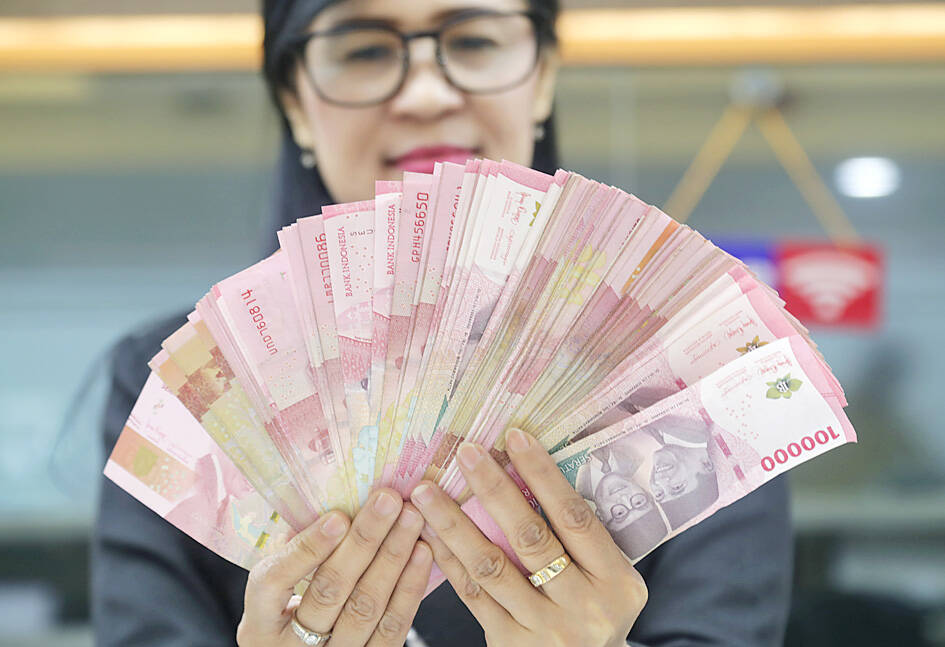Indonesia’s central bank is stepping into the market to support the rupiah that is in its longest losing streak since last year.
Bank Indonesia (BI) is intervening in the spot, domestic non-deliverable forwards and bond markets to maintain currency supply and demand balance, central bank monetary management executive director Edi Susianto said.
“Market confidence needs to be maintained,” Susianto said, adding that the weakness is largely driven by external sentiments.

Photo: Bagus Indahono, EPA-EFE
Susianto’s comments come with the currency set to decline for a sixth straight day. The rupiah along with other emerging market (EM) currencies are coming under depreciation pressure, as signs of resilience in the US economy bolster the US dollar.
“Global market developments have been rather unfavorable for EM currencies, including the rupiah, due to escalating tensions in the Middle East and recent better-than-expected US jobs data,” Susianto said.
The currency weakened as much as 1.3 percent to 15,693 rupiah per US dollar yesterday. It had rallied more than 8 percent in the third quarter on expectations that the US Federal Reserve would persist with heavy rate cuts after its recent half percentage point reduction.
BI was seen supporting the currency in early trading, traders said. That was the first time in months that the central bank had intervened in the market.
The Indonesian central bank has ample resources to support the rupiah, with its foreign exchange reserves remaining near a record. The stockpile stood at US$149.9 billion last month, covering 6.4 months of imports and external debt servicing requirements.
The weakness in the rupiah has lifted expectations that BI might keep its policy rate on hold at its meeting on Wednesday next week after a surprise rate cut last month.
Meanwhile, the New Taiwan dollar ended down NT$0.168, or 0.52 percent, at NT$32.131 against the US dollar in Taipei on Monday, its lowest level since Sept. 10, when it closed at NT$32.173.
Dealers said the US dollar attracted strong buying soon after the local forex market opened, as investors were encouraged by the US nonfarm payroll report, which showed some 254,000 jobs were created last month, beating an earlier market estimate of 150,000.
The robust jobs report might prompt the Fed not to make big rate cuts later this year, following its aggressive 50 basis point reduction last month, dealers said. As a result, the US Dollar index, which traces the value of the currencies of Washington's six major trading partners, rose yesterday, they noted.
According to Taiwan's central bank, the US Dollar index rose 0.61 percent yesterday, sending down regional currencies, with the Japanese yen falling 1.33 percent, the South Korea won 0.64 percent and the Singapore dollar 0.54 percent.
The weakness of those Asian currencies put pressure on the NT dollar throughout yesterday's session, dealers said.
Additional reporting by CNA

In Italy’s storied gold-making hubs, jewelers are reworking their designs to trim gold content as they race to blunt the effect of record prices and appeal to shoppers watching their budgets. Gold prices hit a record high on Thursday, surging near US$5,600 an ounce, more than double a year ago as geopolitical concerns and jitters over trade pushed investors toward the safe-haven asset. The rally is putting undue pressure on small artisans as they face mounting demands from customers, including international brands, to produce cheaper items, from signature pieces to wedding rings, according to interviews with four independent jewelers in Italy’s main

Japanese Prime Minister Sanae Takaichi has talked up the benefits of a weaker yen in a campaign speech, adopting a tone at odds with her finance ministry, which has refused to rule out any options to counter excessive foreign exchange volatility. Takaichi later softened her stance, saying she did not have a preference for the yen’s direction. “People say the weak yen is bad right now, but for export industries, it’s a major opportunity,” Takaichi said on Saturday at a rally for Liberal Democratic Party candidate Daishiro Yamagiwa in Kanagawa Prefecture ahead of a snap election on Sunday. “Whether it’s selling food or

CONCERNS: Tech companies investing in AI businesses that purchase their products have raised questions among investors that they are artificially propping up demand Nvidia Corp chief executive officer Jensen Huang (黃仁勳) on Saturday said that the company would be participating in OpenAI’s latest funding round, describing it as potentially “the largest investment we’ve ever made.” “We will invest a great deal of money,” Huang told reporters while visiting Taipei. “I believe in OpenAI. The work that they do is incredible. They’re one of the most consequential companies of our time.” Huang did not say exactly how much Nvidia might contribute, but described the investment as “huge.” “Let Sam announce how much he’s going to raise — it’s for him to decide,” Huang said, referring to OpenAI

The global server market is expected to grow 12.8 percent annually this year, with artificial intelligence (AI) servers projected to account for 16.5 percent, driven by continued investment in AI infrastructure by major cloud service providers (CSPs), market researcher TrendForce Corp (集邦科技) said yesterday. Global AI server shipments this year are expected to increase 28 percent year-on-year to more than 2.7 million units, driven by sustained demand from CSPs and government sovereign cloud projects, TrendForce analyst Frank Kung (龔明德) told the Taipei Times. Demand for GPU-based AI servers, including Nvidia Corp’s GB and Vera Rubin rack systems, is expected to remain high,